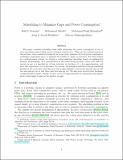| dc.contributor.author | Demaine, Erik D. | |
| dc.contributor.author | Ghodsi, Mohammad | |
| dc.contributor.author | Hajiaghayi, Mohammad Taghi | |
| dc.contributor.author | Sayedi-Roshkhar, Amin S. | |
| dc.contributor.author | Zadimoghaddam, Morteza | |
| dc.date.accessioned | 2014-04-23T20:03:29Z | |
| dc.date.available | 2014-04-23T20:03:29Z | |
| dc.date.issued | 2013-01 | |
| dc.date.submitted | 2010-06 | |
| dc.identifier.issn | 1094-6136 | |
| dc.identifier.issn | 1099-1425 | |
| dc.identifier.uri | http://hdl.handle.net/1721.1/86224 | |
| dc.description.abstract | This paper considers scheduling tasks while minimizing the power consumption of one or more processors, each of which can go to sleep at a fixed cost α . There are two natural versions of this problem, both considered extensively in recent work: minimize the total power consumption (including computation time), or minimize the number of “gaps” in execution. For both versions in a multiprocessor system, we develop a polynomial-time algorithm based on sophisticated dynamic programming. In a generalization of the power-saving problem, where each task can execute in any of a specified set of time intervals, we develop a (1+23α) -approximation, and show that dependence on α is necessary. In contrast, the analogous multi-interval gap scheduling problem is set-cover hard (and thus not o(lgn) -approximable), even in the special cases of just two intervals per job or just three unit intervals per job. We also prove several other hardness-of-approximation results. Finally, we give an O(n√) -approximation for maximizing throughput given a hard upper bound on the number of gaps. | en_US |
| dc.description.sponsorship | Institute for Research in Fundamental Sciences (Iran) (Grant Number CS1385-2-01) | en_US |
| dc.description.sponsorship | Institute for Research in Fundamental Sciences (Iran) (Grant Number CS1384-6-01) | en_US |
| dc.language.iso | en_US | |
| dc.publisher | Springer-Verlag Berlin Heidelberg | en_US |
| dc.relation.isversionof | http://dx.doi.org/10.1007/s10951-012-0309-6 | en_US |
| dc.rights | Creative Commons Attribution-Noncommercial-Share Alike | en_US |
| dc.rights.uri | http://creativecommons.org/licenses/by-nc-sa/4.0/ | en_US |
| dc.source | MIT web domain | en_US |
| dc.title | Scheduling to minimize gaps and power consumption | en_US |
| dc.type | Article | en_US |
| dc.identifier.citation | Demaine, Erik D., Mohammad Ghodsi, MohammadTaghi Hajiaghayi, Amin S. Sayedi-Roshkhar, and Morteza Zadimoghaddam. “Scheduling to Minimize Gaps and Power Consumption.” Journal of Scheduling 16, no. 2 (April 2013): 151–160. | en_US |
| dc.contributor.department | Massachusetts Institute of Technology. Computer Science and Artificial Intelligence Laboratory | en_US |
| dc.contributor.department | Massachusetts Institute of Technology. Department of Electrical Engineering and Computer Science | en_US |
| dc.contributor.mitauthor | Demaine, Erik D. | en_US |
| dc.contributor.mitauthor | Zadimoghaddam, Morteza | en_US |
| dc.contributor.mitauthor | Hajiaghayi, Mohammad Taghi | en_US |
| dc.relation.journal | Journal of Scheduling | en_US |
| dc.eprint.version | Author's final manuscript | en_US |
| dc.type.uri | http://purl.org/eprint/type/JournalArticle | en_US |
| eprint.status | http://purl.org/eprint/status/PeerReviewed | en_US |
| dspace.orderedauthors | Demaine, Erik D.; Ghodsi, Mohammad; Hajiaghayi, MohammadTaghi; Sayedi-Roshkhar, Amin S.; Zadimoghaddam, Morteza | en_US |
| dc.identifier.orcid | https://orcid.org/0000-0003-3803-5703 | |
| dspace.mitauthor.error | true | |
| mit.license | OPEN_ACCESS_POLICY | en_US |
| mit.metadata.status | Complete | |
